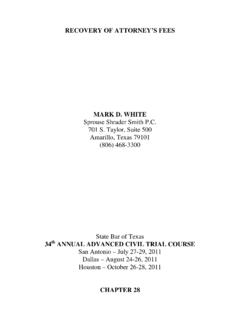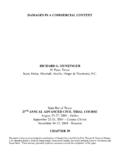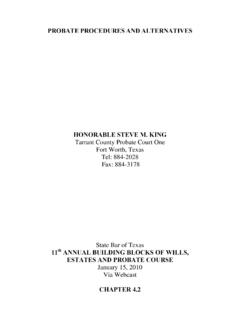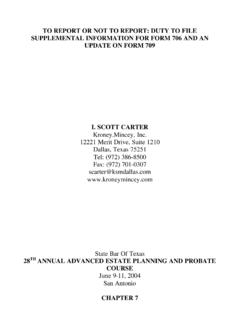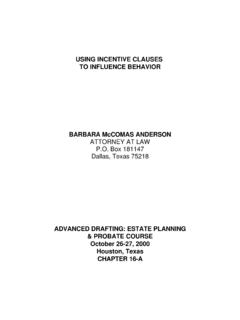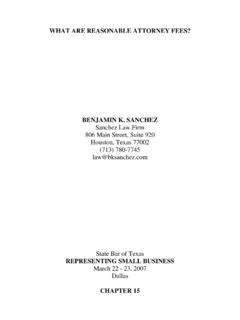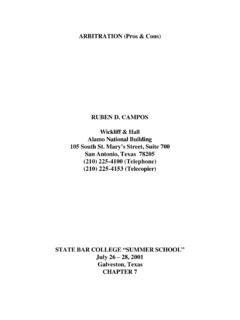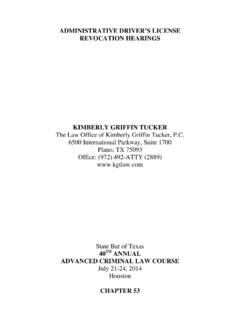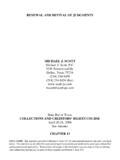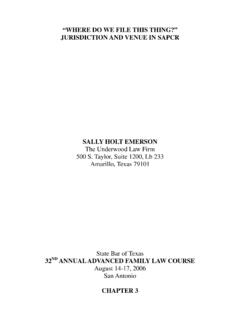Transcription of Sanctions - TexasBarCLE - Texas Continuing Legal …
1 Sanctions THE HONORABLE JUDY WARNE 257th Judicial District Court 1115 Congress Avenue, 6th Floor Houston, Texas 77002 State Bar of Texas 37TH ANNUAL ADVANCED FAMILY LAW COURSE August 1-4, 2011 San Antonio CHAPTER 7 CURRICULUM VITAE OF JUDY LYNN WARNE I. EDUCATIONAL BACKGROUND. A. Undergraduate. University of Saint Thomas, Houston, 1981 Bachelor of Arts Degree in Education and Political Science, Minor in English B. Graduate. University of Houston, Houston, Texas , 1983 C. State Bar of Texas and Law Related Education. Board Certified - Family Law ( Texas Board of Legal Specialization 1989, 1994, 1999, 2004) College of the State Bar of Texas (1991-2006) The Pro Bono College of the State Bar of Texas (1992-2005) Basic Mediation Training, The University of Houston Clear-Lake II. PROFESSIONAL EMPLOYMENT.
2 Presiding Judge, 257th Judicial District Court, November, 2005 to present Administrative Judge, Family Trial Division, Harris County, Texas , 2010-2011 Law Offices of Judy Warne - 1997-November, 2005 Adjunct Professor of Family Law, South Texas College of Law, 1995-1997, 1998- 2003, 2005-present Piro & Lilly - 1990-1997 Law Office of Burta Rhoads Raborn - 1987-1990 Achilles & Associates - 1985-1987 Cammack & Welscher - 1984-1985 III. PROFESSIONAL ASSOCIATIONS. A. State Bar of Texas B. State of Texas , Family Law Council C. Houston Bar Association D. Fellow, American Academy of Matrimonial Lawyers E. Member, Texas Academy of Family Law Specialists F. Member, Gulf Coast Family Law Specialists [former Board Member] G. State Bar of Texas - Family Law Section H. Life Fellow, Texas Bar Foundation I. Life Member, Texas Family Law Foundation J. Houston Bar Association - Family Law Section [former Board member] K.
3 Association of Women Attorneys IV. COURTS WHERE ADMITTED TO PRACTICE. A. State Courts in Texas B. United States Supreme Court V. HONORS - EDUCATIONAL. A. Adjunct Professor of the Year, South Texas College of Law, 2002-2003 B. University of Saint Thomas, Magna Cum Laude; Outstanding Graduate in Political Science; Outstanding Graduate in English C. National Registry of Outstanding College Graduates VI. OTHER PROFESSIONAL ACTIVITIES. Member, Supreme Court Advisory Committee, Child Support and Visitation Guidelines, 1991 and 1992, 1998 through 1999 Member, ABA Committee, Domestic Violence, 1993 and 1994 Member, ABA Committee, Custody, 1993, 1994, 1996, 1997 Member, State Bar of Texas Family Law Council, Pro Bono Committee, 2003 to present VII. OTHER. A. Speaker, Effective Presentation , 35th ANNUAL ADVANCED FAMILY LAW SEMINAR, STATE BAR OF Texas (2009) B. Speaker, Family Judges Perspective on Protective Orders PASADENA BAR ASSOCIATION CLE (2009) C.
4 Speaker, Ad Litem Role in Trial; Bench and Jury , BOOT CAMP FOR APPOINTMENTS IN GOVERNMENT CASES, HOUSTON BAR ASSOCIATION (2009) D. Author and Speaker, Family Law Update ANNUAL JUDICIAL EDUCATION CONFERENCE, Texas CENTER FOR THE JUDICIARY (2009) E. Speaker, The New Designation GULF COAST FAMILY LAW SPECIALISTS (2009) F. Author and Speaker, Getting IT: Dotting the I s and crossing the t s on Requesting Relief THE ULTIMATE TRIAL NOTEBOOK: FAMILY LAW, STATE BAR OF Texas (2009) G. Speaker, Legislative Update , HOUSTON BAR ASSOCIATION ADR SECTION(2009) H. Author and Speaker, Chapter 34, Relative Authorization Texas COLLEGE FOR JUDICIAL STUDIES, Texas CENTER FOR THE JUDICIARY (2010) I. Author and Speaker, Chapter 34 MARRIAGE DISSOLUTION INSTITUTE, STATE BAR OF Texas (2010) J. Speaker, District Judges Panel , FAMILY LAW ON THE FRONT LINES, UNIVERSITY OF Texas CLE (2010) K.
5 Speaker, SAPCR Case Law Update, 36th ANNUAL ADVANCED FAMILY LAW COURSE, STATE BAR OF Texas (2010) L. Author and Speaker, Drafting Protective Orders, ADVANCED FAMILY LAW DRAFTING COURSE, STATE BAR OF Texas (2010) M. Author and Speaker, Establishment of Parentage ADVANCED PARENT CHILD RELATIONSHIPS, UNIVERSITY OF Texas CLE (2011) N. Speaker, 2011 TRIAL INSTITUTE, Texas ACADEMY OF FAMILY LAW SPECIALISTS, (2011) O. Speaker, Effective Presentation of Protective Orders HOUSTON BAR ASSOCIATION FAMILY LAW INSTITUTE (2011) P. Course Director, Marriage Dissolution Institute, STATE BAR OF Texas (2011) Sanctions Chapter 7 i TABLE OF CONTENTS I. INTRODUCTION .. 1 II. WHY DO COURTS IMPOSE THEM? .. 1 III. PLEADINGS .. 1 A. What Does Rule 13 Say? .. 1 B. What Do the Civil Practice and Remedies Code Chapters Say? .. 1 C. Do you Need a Motion? .. 2 D. Do you Need a Hearing? .. 2 E. What is the Test?
6 2 F. Get the Findings .. 3 G. Post-Judgment Sanctions .. 4 IV. DISCOVERY .. 4 A. The Rule Texas Rule of Civil Procedure 215 is cited verbatim herein .. 4 B. Why Do Courts Impose Them? .. 7 C. Do you Need a Motion? .. 7 D. Do you Need a Hearing? .. 7 E. Where do you file? .. 7 F. What Do They Cover? .. 7 1. Pretrial Behavior only sort of .. 7 2. Docket Control Orders .. 8 3. The Behavior in the Entire Case .. 8 G. How Severe Can The Sanctions Be? .. 8 H. Oh Yes, and Get Findings! .. 9 I. But Not Those Kind--No, You Don t Get Findings of Fact .. 10 V. INHERENT POWER TO SANCTION--BEHAVIOR .. 10 A. Who Do You Sanction? .. 10 B. When Do You Sanction Them? .. 10 VI. PRACTICE TIPS .. 11 A. Be the Lawyer .. 11 VII. CONCLUSION .. 12 Sanctions Chapter 7 1 Sanctions I. INTRODUCTION The purpose of this paper is to discuss not only the reasons courts impose Sanctions , but also the behavior that warrants them, the rules that justify them, and the logistics of making them stick.
7 II. WHY DO COURTS IMPOSE THEM? There are three primary reasons a court will impose Sanctions : 1) to secure compliance with rules, 2) to punish violators and 3) to deter other litigants from violating the rules. The authority to sanction is derived from Chapters 9 and 10 of the Texas Civil Practice and Remedies Code, Texas Rules of Civil Procedure Rule 13 and Rule 215, and the courts inherent power to punish those who abuse the judicial process. III. PLEADINGS The most common method of sanctioning a party and/or their attorney regarding pleadings is under Texas Rules of Civil Procedure 13 and Texas Civil Practice and Remedies Code Chapters 9 and 10. A quick look at the language of those provisions is helpful. A. What Does Rule 13 Say? The signatures of attorneys or parties constitute a certificate by them that they have read the pleading, motion or other paper; that to the best of their knowledge, information and belief formed after reasonable inquiry the instrument is not groundless and brought in bad faith or groundless and brought for the purposes of harassment.
8 1 The burden in these proceedings is on the party seeking the Sanctions to overcome the presumption that all pleadings are filed in good What does all that mean? Bad faith is the conscious doing of a wrong for a dishonest, discriminatory, or malicious Improper motive is an essential element of bad The rule itself defines groundless as having no basis in law or 1 13 (2011) 2 Low v. Henry, 221 609 ( ) [presumption that pleadings are brought in good faith] and In re , 172 710( Fort Worth 2005, no pet.) [burden in Sanctions hearing] 3 Keith v. Solls, 256 912 ( Dallas 2008, no pet.) 4 Parker v. Walton, 233 535 ( Houston [14th dist.] 2007, no pet.) fact and not warranted by a good faith argument for the extension, modification, or reversal of existing As a practical matter, this means that you should read what you file and be sure it is not only an accurate statement of the facts [to the extent you ve plead them], but also that the pleading states a cause of action which your client has standing to bring, and/or is supportable by the arguments permitted by Rule 13.
9 Other than the parameters set by the rule itself, Sanctions orders are reviewed with an abuse of discretion standard, which means that the reviewing court will review the trial court s behavior to determine whether or not that judge acted without regard to any guiding rules or principles6 or reaches a decision so arbitrary and unreasonable as to amount to a clear and prejudicial error of law. 7 B. What Do the Civil Practice and Remedies Code Chapters Say? Chapter 9 of the Civil Practice and Remedies Code contains very similar language, with the signing of a pleading constituting a certificate by the signatory that to their best knowledge, information and belief, formed after reasonable inquiry, the pleading is not: (1) groundless and brought in bad faith; (2) groundless and brought for the purposes of harassment; or (3) groundless and interposed for any improper purpose, such as to cause unnecessary delay or needless increase in the cost of litigation.
10 8 Similarly, Section of the Texas Civil Practice and Remedies Code has language that goes even further than Rule 13 and says The signing of a pleading or motion as required by the Texas Rules of Civil Procedure constitutes a certificate by the signatory that to the best of the signatory s knowledge, information and belief, formed after reasonable inquiry: (1) the pleading or motion is not being presented for any improper purpose, including to harass or to cause unnecessary delay or needless increase in the cost of litigation; (2) each claim, defense, or other Legal contention in the pleading or motion is warranted by existing law or by a nonfrivolous argument for the extension, modification, or reversal of existing law or the establishment of new law; (3) each allegation or other factual contention in the pleading or motion has evidentiary support or, for a specifically identified allegation or factual contention, is likely to have evidentiary support after a reasonable opportunity for further investigation or discovery; and 5 13 (2011) 6 Houtex Ready Mix Concrete v.
